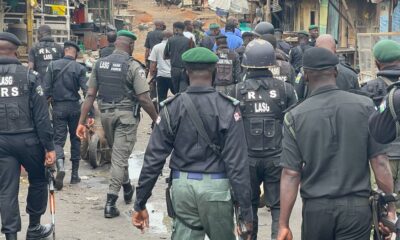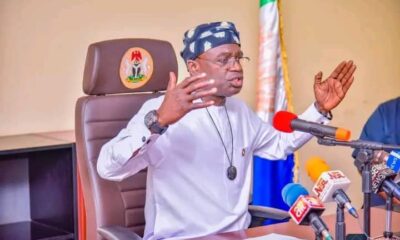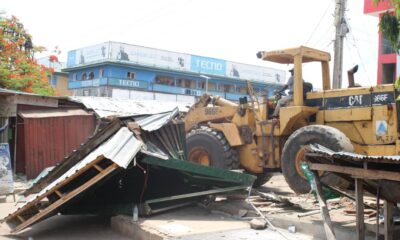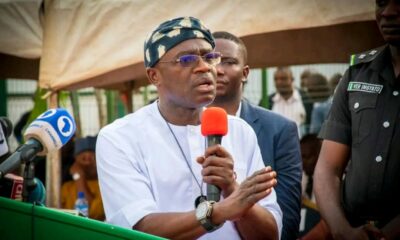Benue news
Historical overview of Makurdi, Benue state capital

BY: Yakubu Useni
The essence of history is to know the past and amend the future. Makurdi before the advent of European explorers into Nigeria and Benue areas in 1850s, were nothing short of villages, towns and clans scattered on the Bank of the Two Rivers Benue and Niger. These towns and villages according to Asemanya (2018) were and are Lokoja, Ajiwo, Agyetashi (Clerk Quarters), Igyaha, Rogon-koto (but since disappeared from the modern map); Konoku or Agbodo; Anmor (M u), Azhoko (Ankwa) Abise now Abinsi. Others include Anyishi, ( now Anyebe), Asugu, Anuwha, Azyamindo, Arufu Ashukwu, Andosede (Gbajimba), Akwana Ando-nufo, Afanu up to Ibi in present day Taraba state. Apart from the two mentioned, Lokoja and Loko, all others are either Jukun Wanu or Agatu villages. What is today Makurdi according to Asemanya never existed because the area was no more than a dense forest . The only villages inhabited around the present Makurdi were and Still are the old Igyaha an (Agatu settlement) about two kilometers South of Makurdi Town. Also, there exist Agyetashi, Ajiwo Agatu and Jukun Wanu and Alago settlements at the North bank of River Benue Agyogo which part of it is called wurkum and Anmor (mu) at the South Bank. These areas mentioned were first settled by Agatu, Alago, Idoma and Jukun Wanu people, who were said to have been dispersed during the Idah migration in 1625-1775, where some of their kith and kins crossed the river Benue to establish the present kingdoms of Keana and Doma in the present Nasarawa State.
These settlements existed for some time before the arrival of Tiv factions such as Ihyarev and Massev. They also claimed indigenous and earlier settlers of Makurdi, but available records have indicated that, the Agatu, Alago Doma and the Jukun Wanu were the earliest settlers as indicated in their settlements earlier mentioned. Thereafter, these groups were followed by Bachama, Kakanda, Nupawa Wurkum and Hausa ethnic nationalities equally came to settle in Makurdi and environs hence you have names such as Makurdi, Daudu, Taraku, Bakin Kwata, Wadata, Wailoamayo, Wurkum, Mai-adiko, and so on. The names speak for themselves and therefore need no further elucidations.
By early 1920s according to Asemanya, more and more of the Hausas came to settle in Makurdi as a result of the construction of the Makurdi old bridge across the river Benue. At the beginning of the 19th century, white men were concentrated in Abinsi. Apart from being the Administrative Headquarters of the RNC, Abinsi was also the Administrative Headquarters of the old Benue Province as well as the Headquarters of the West African Frontier Force (W.A.F.F) during the Cameroon campaigns (1914-18). The importance of Abinsi according to Asemanya, began to decline due to exigency of the construction of the old bridge over the River Benue to link Eastern and Northern Nigeria together. The position of Abinsi for this noble project according to Asemanya, was grossly unsuitable thus, began search for a suitable area particularly in order to connect the rich and serene Jos Plateau for easy transportation of raw materials (minerals) to the southern Seaports of Lagos and Port Harcout. The ABISEKU (Chief)of Abinsi at this period was Azyidoku Agabi (1906-1928), who led the European officials among them was the Resident of Benue then Mr. JM Freemantle to Agyogo (Wurkum). After a detailed survey, what was to become the modern Makurdi was considered most suitable and most desired for first Benue Bridge. The work which started in 1925, was was however completed in 1932 and was opened to traffic. Long before 1934, when the Tiv Land was reorganized, Makurdi according to Asemanya was ruled by A Yoruba man from IIorin the present day Kwara State Mallam Audu Dan Foda who was the political agent for the colonialists and the Headman during the construction of the bridge, was made the chief of Makurdi from 1914-1846.
ORIGIN Of THE WORD MAKURDI
Various interpretations have been given to the word MAKURDI, but in whatever, corruption the word came from, it was usually associated with the rulership of Audu Dan Foda. In 1912 Mallam Audu was brought from Ibi in present Taraba State to Abinsi by the White men as a local interpreter , maybe because he was versed in speaking local languages especially the Hausa. Audu soon became indispensable and was given free hand to recruit labourers for the construction of the Railway. Audu Dan Foda served in this capacity up to 1925 when the bridge was to be built. Apart from these roles Audu also settled and resolved conflicts between the colonialists and the workers usually on the non payment of workers wages . Further more, Audu equally provided traders and travellers with accommodation, feeding and sometimes with lavished gifts. Audu was a Colonial tax assessor and collector particularly, with the introduction of forex tax (Kudin daji). The duties according Asemanya, he consciously did with perfection. Withe growing responsibilities and the fact that, Audu collected taxes (money) and was one of the few Colonial agents that new the Colonial Treasury at this period, coupled with the fact that he harbored a good number of travelers with generous gift. He was also said to be a proud man because of all these attributes, Audu became famous and popular and people began to address him MAIKUDI” meaning a wealthy man or rich man. The word later metamorphosed into Makurdi as pronounced today . Another version of the name according to Asemanya, Makurdi is when Mallam Audu Dan Foda was offered the kindred Head of Abinsi by Azyidoku Agabi (1906-1928) he Audu however chose to stay along the bank of River Benue, a place called Gungu (still) in existence at the North Bank _ getaren-waya . In 1929, the colonialists appointed Audu as a 3rd class Chief and was given staff of office. This staff was nicked named MAIKWANDO by the White men because he Mallam Audu Always move about with a basket (Kwando) fastened on his cycle. It was the word MAIKWANDO that was probably corrupted to MAIKUDI. But the Jukun Wanu referred to Makurdi as “Abonkwe” meaning place where people buy and sell fish . Actually, Makurdi was a fishing port where fishermen, viz, Jukun, Agatu, Bachama Kakanda, Ijow etc converged . Till date Makurdi is playing this role.
Moreover, gungu which was situated not far from the river was a hide out for robbers. These thieves usually attacked traders and travellers plying the routes and made away with their property. Travellers coming from Lokoja in kogi , Loko in Nasarawa and katsina-Ala in Benue States respectively were mostly affected. The only situation in used to avoid the robbers was for the travellers and traders to pass information to each other that if they could meander from the gungu perhaps they could beat the robbers and get away without being attacked. Having settled in the gungu, Audu Dan Foda began to attack the robbers and dislodged these thieves with great success. Sarki Audu then moved to the south bank with his people who were made up of Jukun, Agatu, Alago, Doma, Bachama and Hausa into a virgin land to settle in what is today known as Makurdi. Makurdi thus acquired it’s name from the strategy adopted by travellers to escape the robbers around gungu the first settlement. This strategy was for the travellers to meander their ways, a word which has its meaning in hausa as KURDA the new settlement was thus called MAIKUDI. It was this word that was later metamorphosed to Makurdi meaning, the place or thing to meander through.
Gradually as Makurdi began to grow Hausa became the lingual franca among the Residents. Asemanya (2018). But not even Hausas could claim Makurdi as theirs because Agatu, Alago, Jukun, and idoma had earlier settled in aroud Makurdi. The Tiv people on the other hand settled far away to west of Makurdi with their Chiefs as GWATA and ZIKO leaving the Hausa and other tribes to occupy the central township. This arrangement has remained till date.
However, other areas have sprang up of recent I.e Anpka, Quarters, Logo 1and 2, commissioners Quarters, North Bank, forming parts of central Makurdi. Other areas include but not limited to Nyiman, Achusa, Kertyo, Kanshio etc were settled by some Tiv group- the Kparev who might have came to Makurdi during its early stage of development especially, during the construction of the old bridge and Railways.




















